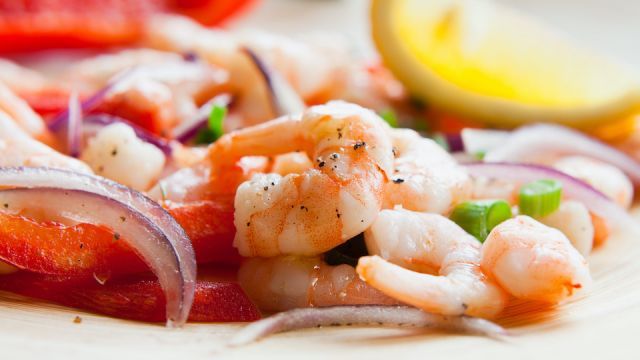
Whether it’s for onions, shrimp, or any other food, recalls protect the public from products that may cause illness or even death. Recalled foods are removed from the marketplace because they are either contaminated with a foodborne pathogen, contain a food allergen not listed on the label, or contain a physical contaminant. So, it’s important to take them seriously. As it turns out, the recent recall of both onions and shrimp shares the same potentially dangerous foodborne pathogen. Here’s everything you need to know about the latest recall.
Latest onion recalls due to possible health risk
Most recalls are done voluntarily by companies who discover problems with their products. From there, various organizations like the U.S. Food and Drug Administration (FDA), United States Department of Agriculture (USDA), and The Centers for Disease Control and Prevention (CDC) get involved.
Taylor Farms Texas, is recalling products containing onions due to the expanded onion recall initiated by Thomson International, Inc. These recalls are the result of a potential outbreak of salmonella contamination. Meanwhile, the CDC, FDA, public health and regulatory officials in several states and Canada are investigating a multistate outbreak of Salmonella infections linked to onions.
According to the FDA, the potentially affected onions have been used in the following foods and sold and the following stores:
Kroger:
- Taylor Farms — Macaroni Salad, 9.9 oz. container
- Taylor Farms — Rotini Pasta Salad, 10 oz. container
- Taylor Farms — Croissant Sandwich (Chicken Salad)
Walmart:
- Marketside — Diced Yellow Onion, 8 oz. tray
- Marketside — Diced Mirepoix, 10 oz. tray
- Marketside — Fajita Stir Fry, 8 oz. tray
- Taylor Farms — Chicken Salad Croissant Sandwich, 6.25 oz.
For product UPCs, best by dates and lot codes, please visit the FDA website. No other Taylor Farms products are affected by this recall. In the meantime, the retailers have been instructed to get rid of any remaining product from store shelves and any still remaining in the store’s inventory. If you’ve purchased any of these products, do not consume them — throw away the recalled products immediately. If you can’t tell where your onions came from, don’t eat them. If you have any healthcare concerns regarding any of the recalled products, contact your healthcare provider.
- For further information, call (855) 455-0098 — between the hours of 9 am (CST) and 5 pm (CST) Monday through Friday.
Shrimp under recall due to salmonella
Kader Exports has recently recalled some of its frozen peeled, deveined and cooked shrimp sold nationwide due to possible contamination with salmonella. If you recently purchased shrimp under any of the various brand names below, it could be contaminated.
- Kirkland (Costco’s house brand)
- Aqua Star Reserve
- Censea
- Fresh Market
- Unistar
- Tops and Wellsley Farms
For product description and codes, please visit the FDA website. If you have purchased any of the above products, the FDA urges you to return them to the place of purchase for a full refund.
What is salmonella, and how does it contaminate foods?
Each year there’s an estimated 1,400,000 cases of salmonella poisoning in the U.S. alone. But the truth is, salmonella bacteria cause most of the food poisoning throughout the world since salmonella lives in the intestinal tracts of humans and other animals. With Americans consuming record amounts of meat and poultry each year — on average, 222.2 pounds per person — according to Bloomberg, salmonella is thriving.
Salmonella is a general name for about 2,000 closely related bacteria that cause illness by multiplying in the digestive tract. Foods contaminated are typically of animal origin, including beef, poultry, eggs, or dairy. However, any food, even fruits and veggies, can become cross-contaminated. Here’s the thing, contaminated foods normally don’t look or smell any different from non-contaminated foods. So, you may not know a product is contaminated until someone becomes ill.
Symptoms of salmonella poisoning
Salmonella poisoning is rarely fatal — less than one percent. However, according to the CDC, Salmonella bacteria causes approximately 26,500 hospitalizations and 420 deaths in the United States each year. Food is behind most of these illnesses.
- Symptoms may include vomiting, cramping, diarrhea, headache, muscle aches, chills, nausea, fever, and dehydration. Most people, according to the CDC, will experience diarrhea, stomach cramps, and fever.
- Symptoms typically start six hours to six days after infection and can last anywhere between four to seven days.
- Some symptoms may be so severe that hospitalization is required. However, most people recover without needing any treatment.
Here’s what to do during this recall
- Visit foodsafety.gov for recent recalls.
- Check your freezer, refrigerator, and cupboards for the product.
- If you have the recalled product in your home, read the food label and compare it to the manufacturer’s lot codes on the recall notice. If it’s a match, do not eat it or feed it to your pets.
- Follow the instructions provided by the manufacturer or grocery store regarding returning or disposing of the product.
Watch out for contaminated onions and shrimp under the recall. Keep in mind, only products listed in the recall are deemed unsafe for consumption. Stay safe!
-Katherine Marko

